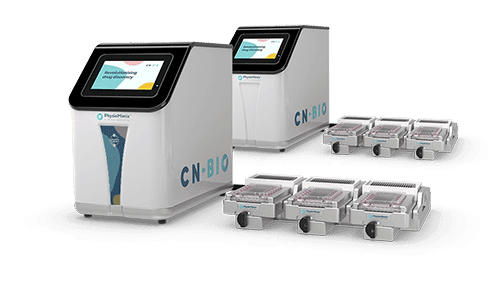- Next generation organ-on-a-chip (OOC) technology to be used to investigate the human gut microbiome for improving outcomes for patients with liver cirrhosis
- Adoption follows successful collaboration demonstrating value of PhysioMimix’s ability to recapitulate physiological functions of the human intestinal villi
CN Bio, a leading Organ-on-a-chip Company (OOC) that designs and manufactures single and multi-organ microphysiological systems (MPS), today announced that King’s College London, an internationally renowned research university, has adopted the PhysioMimix® Multi-Organ MPS. Following a successful research collaboration, King’s College London selected the system to create a unique human-relevant liver-intestinal model for characterizing and manipulating host-microbial interactions, to support improved outcomes in cirrhosis. Launched in March 20211, CN Bio’s next-generation Multi-Organ MPS combines their industry-proven in vitro 3D liver model with a range of other organs, to provide a flexible in vitro human-relevant alternative to animals that facilitates the investigation of inter-organ cross talk effects.
There is an increasing burden of chronic liver disease worldwide, with cirrhosis and the complications of viral hepatitis accounting for 2 million deaths per year2. The gut microbiome is significant in the pathogenesis of cirrhosis; caused by an imbalance between healthy and pathogenic gut bacteria. However, identifying key biomarkers and understanding how to manipulate the resident microbiota to improve outcomes in cirrhosis remains a major area of unmet clinical need. CN Bio’s PhysioMimix Multi-Organ MPS will provide King’s College London’s research team with the versatility to create a human two-organ liver-intestinal model to investigate the gut microbiota-liver axis and identify key progressive stages towards liver failure. By using multifaceted-omics analysis, their research aims to explore modulating the microbiome, to restore the gut barrier function and innate immunity, and subsequently develop novel interventions that minimise further liver deterioration.
CN Bio’s PhysioMimix OOC range of single and multi-organ MPS enable researchers to generate sophisticated in vitro organ models within an environment that more accurately represents the human body than static cell culture. For a deeper mechanistic understanding of disease states and drug behaviour, their Multi-Organ MPS enables researchers to mimic how organs interact and communicate as part of a complex system, better representing human inter-organ crosstalk effects compared to single-organ MPS or animal models. Through this important collaboration with King’s London College, the application of CN Bio’s liver-on-a-chip models for chronic liver disease research, which currently includes advanced in vitro assays for non-alcoholic fatty liver disease (NAFLD), steatohepatitis (NASH) Hepatitis B virus (HBV), and alcoholic hepatitis3, will be expanded.
Professor Debbie Shawcross, Professor of Hepatology and Chronic Liver Failure, School of Immunology & Microbial Sciences, King’s College London, said: “Human Gut-liver-Chip technology has the potential to provide significant ethical and research advantages over animal models, including easier manipulation and removal of cross-species translatability. We hope to evidence the utility of this platform, to benefit research in liver disorders and the microbiome space, for which liver or intestinal data could help find potential therapeutic solutions.”
“This is a cutting-edge collaboration, with a world-leading university; we are pleased to see it result in the adoption of our new PhysioMimix multi-organ platform, demonstrating the industry’s motivation to advance to the next generation of Organ-on-a-chip research. As a Company, we are striving to expand the boundaries of humanized pre-clinical research towards Body-on-a-chip, moving away from isolated individual organs to more complex biological systems, previously only possible using animal models.” commented Dr Tomasz Kostrzewski, Director, Biology, CN Bio “This research highlights the flexibility and value of our platforms for new model development, particularly in these areas with an increasing global burden.”
- CN Bio introduces the PhysioMimix® OOC Multi-Organ Microphysiological System (17th March 2021)
- Fleming KM, Aithal GP, Card TR, et al. All-cause mortality in people with cirrhosis compared with the general population: a population based cohort study. Liver Int 2012;32(1):79-84.
- CN Bio and Imperial College London collaborate to identify novel treatments for alcoholic hepatitis (8th September 2020)

